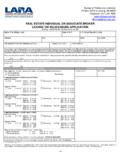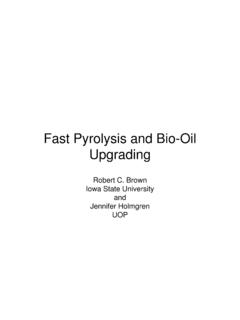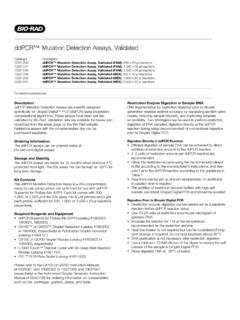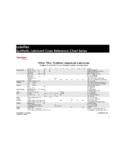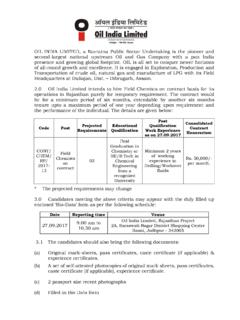Transcription of Feasibility Study & Preliminary Business Plan for a ...
1 Feasibility Study & Preliminary Business PLAN FOR A MICHIGAN SOYBEAN CRUSH PLANT, SOYBEAN OIL REFINERY AND/OR BIODIESEL PRODUCTION PLANT IN GRATIOT COUNTY OR OTHER MICHIGAN SITES PHASE 2 REPORT Feasibility OF A STAND-ALONE BIODIESEL PLANT (WITH SOYBEAN CRUSH PLANT & SOY OIL REFINERY SUBJECT OF A PRIOR PHASE 1 REPORT) PREPARED BY & FOR THE MICHIGAN DEPARTMENT OF AGRICULTURE LANSING, MICHIGAN February 15, 2006 TABLE OF CONTENTS I. Statement of Work .. 2 II. Background .. 3 III. Executive Summary Phase 1 / Soybean Crush Plant & Soy Oil Refinery .. 6 IV. Update to Phase 1 Report .. 8 V. Executive Summary Phase 2 / Stand-Alone Biodiesel Plant .. 9 VI. Introduction to the Biodiesel Industry .. 13 VII. Supply & Demand for Biodiesel A. United States .. 16 Demand Drivers for Biodiesel .. 18 B. Michigan .. 22 VIII. Biodiesel Manufacturing Technology A. Process Technology Description .. 24 B. Process Technology Suppliers .. 26 C. Environmental Permit Issues.
2 30 IX. Management Requirements .. 33 X. Financial Feasibility of a Stand-Alone Biodiesel Plant A. USDA Loan & Grant Programs .. 36 B. Michigan s 21st Century Jobs Fund .. 37 C. Capital Investment in Plant & Equipment .. 38 D. Working Capital Requirements .. 40 E. Total Investment & Equity Requirements .. 41 F. Biodiesel Production Cost .. 41 G. Historical Soy Oil & Petroleum Distillate Pricing .. 44 XI. Site Selection & Related Factors .. 46 XII. Conclusions Phase 2 / Stand-Alone Biodiesel Plant .. 49 XIII. Appendix .. 51 2 I. STATEMENT OF WORK1 The Grant Agreement between MDA and REMCO LLC & De Smet Ballestra states: The Michigan Department of Agriculture (MDA) is .. exploring the possibility of .. either a soybean crushing (SC) and/or a crude soybean oil processing, refining and esterification plant (SOPREP) or only a refined soybean oil esterification plant (REP) in Gratiot County, Michigan. Other Michigan sites for only a REP will also be explored as options.
3 It is an objective .. to produce a finished biodiesel fuel product (B100) that meets standards specified under ASTM D-6751, prior to use as a commercial fuel or being blended with petroleum diesel fuel. It is expected that the annual capacity of the contemplated biodiesel facility would be 5 to 10 million gallons. The State of Michigan and MDA do not currently know the Feasibility of the above-mentioned three options. In order to assist interested entities in building a manufacturing facility that produces neat biodiesel, there is a need to Study the Feasibility of the SC and/or SOPREP or only REP options. 1 2006 Geoffrey S. Soares This report has been prepared by Geoffrey S. Soares, President, REMCO LLC, 27980 Alpine Lane, Yorba Linda, California 92887, in conjunction with Martin L. Ross, Director Marketing, REMCO LLC, with technical assistance from W. Wes Berry, Director Technology, REMCO LLC and Timothy G. Kemper, President, De Smet Process &Technology Inc.
4 , Marietta, Georgia. Questions or comments regarding this report should be addressed to Mr. Soares The authors wish to extend their special thanks to Robert Craig, Director, Agriculture Development Division, Michigan Department of Agriculture, Keith Reinholt, Director of Field Operations, Michigan Soybean Promotion Committee, and John Oakley, Treasurer, Capital Area Producers Cooperative for their significant contribution of time and effort expended in the development of this Study . Alan Thrush, President, Economic Analysis and Research, also deserves thanks for his extensive in-kind research contribution. There are many others who contributed to this Study but who, for reasons of confidentiality, must remain unnamed. To them, and to the many sponsors of this Study , our thanks as well. 3 II. BACKGROUND This is best described by the following article published by the Michigan Department of Agriculture on their web-site ( ) as part of The New Market Developer, Issue 1, 2005 (with highlighted sections shown for emphasis): Issue 1, 2005 MDA Receives USDA Grant for Feasibility Study on a Soybean-Biodiesel Production Plant MDA submitted an application in early February to USDA Rural Development for a Rural Business Enterprise Grant (RBEG) and will receive $65,000.
5 It is for technical assistance to conduct a Feasibility Study and Preliminary Business plan development as well as to rapidly assess the development opportunities for a soybean crushing and biodiesel production plant in Wheeler Township, Gratiot County, Michigan. MDA is conducting the project along with the Michigan Soybean Promotion Committee, Michigan Corn Marketing Committee, Capital Area Producers Cooperative (CAP Co-op), Michigan Farm Bureau and Gratiot County Farm Bureau, Greater Gratiot Development and MSU Extension/Gratiot County along with several individual farmers and agri-businesses. The CAP Co-op has its headquarters in Mason, as well as their subordinate elements, being the Capital Area Innovative Farmers Organization and Mid-Michigan Buyers Group. The CAP Co-op is a 501 7 organization consisting of 23 agricultural producers of corn, soybeans and other commodities, from various mid-Michigan counties, including Gratiot County. MDA and its partners are exploring the possibility of a private Business establishing a soybean crushing (SC) and/or a crude soybean oil processing, refining and esterification plant (SOPREP) or only a refined soybean oil esterification plant (REP) in Gratiot County, Michigan.
6 It is their objective to produce a finished biodiesel fuel product (B100) that meets standards specified under ASTM D-6751, prior to use as a commercial fuel or being blended with petroleum diesel fuel. It is expected that the annual capacity of the contemplated biodiesel production facility would be 5-10 million gallons. MDA doesn t know the Feasibility of its three options on an industry group building a manufacturing facility that produces neat biodiesel and other associated products and needs a professional Study of the SC and/or SOPREP or only REP options. If any of these are proven feasible, it is estimated that between 10 and 60 full time jobs will be created by this new small and emerging, rural private Business . These job numbers are the range from three nationally recognized consultants who provided competing bids on this Feasibility Study proposal. The recommended firms to conduct the Feasibility Study are REMCO LLC and De Smet Ballestra. These two firms will also prepare a Preliminary Business plan, if the initial Study demonstrates Feasibility .
7 They were successful bidders in a competitive bidding process of national firms vying to do the Study last winter. MDA and others will rapidly assess the development opportunities and challenges for Biodiesel Plant Production in Wheeler Township, Gratiot County, Michigan. As the Study progresses, further alternative sites may be identified by MDA and others for REMCO and De Smet Ballestra to Study as a 4 result of such factors as proximity to lower cost feedstock or end-product markets, if the Gratiot County fully integrated project is not feasible. The primary project area of interest is in the Gratiot County Renaissance Zone area in Wheeler Township and near McClelland Road. Gratiot County is a prominent agricultural county in mid-Michigan that is an economically depressed rural area. Wheeler Township has a population of 2,785 people. The partnership's ultimate goal is to foster and sustain small rural farm Business establishments and other rural businesses to examine the development opportunities of new emerging, soybean-biodiesel processing Business operation in Wheeler Township of Gratiot County.
8 Michigan small farmers and processors in the target area desire to participate in value-added processing Business ventures and market their soybean commodities through a profitable value-added processing Business . If they can sell their soybeans to a nearby soybean-biodiesel fuel processor, higher bids for their commodities and lower feed costs to livestock and poultry feeders who purchase protein concentrates may result. Value-added processing Business ownership opportunities to small farmers may emerge. While the feedstock for the proposed biodiesel plant is expected to be primarily refined, virgin soybean oil, it is the intention of MDA to be flexible and obtain corn oil, recycled cooking oil from restaurants, yellow grease, animal fats from rendered livestock and other vegetable oils as secondary feed stocks for the biodiesel manufacturing facility. Without profitable, value-added markets, the future of Gratiot County s agricultural industry is dismal. Putting the Gratiot Renaissance Zone property into a productive use that provides basic value-added agriculture manufacturing investment and employment is a crucial step toward assuring mid Michigan s long-term economic viability and community growth.
9 The State of Michigan recognized the social and economic challenges facing Gratiot County and Wheeler Township back in January 1, 1997 when following extensive community planning and economic development meetings, the Michigan Economic Development Corporation and Strategic Fund Board of Directors approved their Rural Renaissance Zone application and designated a Gratiot-Montcalm County Renaissance Zone. Background on Michigan s Ethanol and Biodiesel Situation Biobased products are non-food, non-feed agricultural chemical products provided as raw materials for various industries. The government has set the goal of tripling American use of bioenergy and biobased products by the year 2010. Department of Agriculture estimates that meeting this goal could create $15-20 billion a year in new income for farmers and rural America and reduce annual greenhouse gas emissions. The growth in consumption of ethanol and biodiesel fuels, both nationally and within Michigan, has grown significantly over the past five years.
10 As new production facilities are constructed to meet this expanding biofuels use, particularly here in Michigan with Caro s new Michigan Ethanol LLC facility now in operation, it behooves us to be keenly aware of the Michigan energy markets for the supply and demand of products coming from such facilities. New 50 million gallon a year ethanol plants are also being studied to be built in Michigan with some likely to break ground later this year. While no biodiesel esterification/production facilities currently exist in Michigan, several organizations have made the switch to using soy-based biodiesel fuel in their fleet. These include the Postal Service, USDA, Michigan Department of Management and Budget, University of Michigan-Ann Arbor, St. Johns Public Schools, Ithaca Public Schools, Zeeland Public Schools, the Pictured Rocks National Lakeshore, Consumers Energy and others. An assessment of market demand for biodiesel fuel in Michigan will also be undertaken in cooperation with the Michigan Farm Bureau, Michigan Soybean Promotion Committee, Michigan State University Extension and others.


